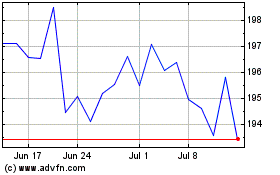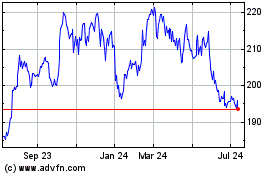Illinois Senate Approves CME-CBOE, Sears Tax Relief Bill
November 29 2011 - 4:46PM
Dow Jones News
The Illinois Senate on Tuesday approved tax relief for Chicago's
derivatives exchanges and a major retailer, all contemplating a
move to other states that might offer them a better deal.
Senators voted 36-18 to move the measure to the Illinois House,
which also expected to take a final vote on Tuesday. Democrats
control both chambers of the state legislature, and the Governor's
office. Governor Pat Quinn, who is seeking additional tax relief
for working people, has yet to indicate whether he would sign the
bill.
The legislation allows CME Group Inc. (CME) and options exchange
CBOE Holdings Inc. (CBOE) to be taxed on 27.54% of all electronic
trades, which account for the vast majority of the business
performed at the exchanges. Currently, the exchanges pay taxes on
100% of their electronic transactions.
The tax breaks won't kick in for CME and CBOE until the start of
the next fiscal year, which begins July 1, 2012.
Retailer Sears Holdings Corp. (SHLD) would pay lower taxes
through the renewal of a special taxing district in the Chicago
suburb of Hoffman Estates, which is Sears' headquarters.
"We're not blowing a hole in the budget in the near-term," said
Democratic Senator Toi Hutchinson, who introduced the Senate's
latest version of the bill.
Some lawmakers have criticized CME, in particular, for
threatening to leave the fiscally troubled state even as it posts
healthy earnings. CME reported profit of $361.1 million in the
third quarter, up from $244 million in the same period a year
ago.
Sen. Hutchinson came to CME's defense. "They're still going to
be one of the highest taxpayers in the state," Hutchinson said.
CME is being taxed as if the business is based on "hand-to-hand
combat" in the trading pits, said Hutchinson, even though floor
transactions represent only a small percentage of all trades.
To win political support, lawmakers expanded the tax deal to
provide relief to Illinois's small businesses and individual
workers.
Workers would receive a 10% increase in earned income tax
credits by fiscal year 2014 under the Senate bill, while the House
calls for a 7.5% boost. They are both less than what was proposed
by Gov. Quinn.
Republicans complained that earned income tax credits don't
create or retain jobs, but Sen. Hutchinson contended that putting
more money in workers' hands lifts consumer demand.
Only the trading floors, located at the CME-owned Chicago Board
of Trade, would remain in the city, said CME Chairman Terry Duffy
at a legislative hearing earlier this month.
CME and CBOE protested the state legislature's vote in January
to raise the state's corporate tax to 7%, from 4.8%.
For CME, the tax hike cost an extra $50 million per year,
according to Duffy.
It was not acceptable, Duffy said, that CME pays 6% of all
corporate taxes collected by the Illinois government.
The CME chairman told the House committee that the exchange
operator's board of directors is reviewing "very, very lucrative"
offers from other states.
-By Howard Packowitz, Dow Jones Newswires; 312-750-4132;
howard.packowitz@dowjones.com
CME (NASDAQ:CME)
Historical Stock Chart
From Jun 2024 to Jul 2024

CME (NASDAQ:CME)
Historical Stock Chart
From Jul 2023 to Jul 2024
